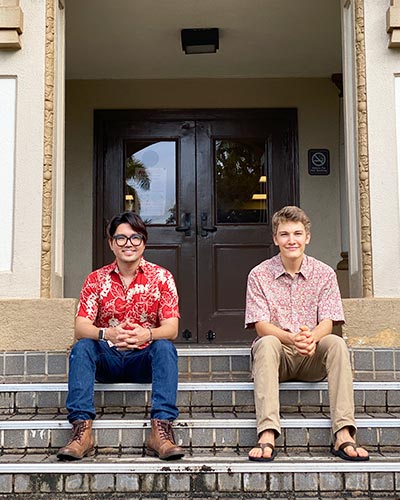“What surprised me was that so many people talked about the ‘silver linings’ of the pandemic. Part of that had to do with rekindling relationships with old friends and family members, or being able to experience beaches and hikes without all of the tourists.” – Micah Mizukami, associate director, Center for Oral History (COH).
“Many of the interviewees felt it was important to share their stories to inform future generations. Nearly every narrator believed we would see another pandemic within the next 100 years, so they wanted to offer their insights to promote resiliency in future pandemics.” – Stephen “Pono” Hicks, COH undergraduate research assistant.
“I think people will come out of this with a stronger appreciation for human connections, because that’s what really enriches our lives, not things.” – Kristine Qureshi, former associate dean, Nancy Atmospera-Walch School of Nursing, UH Mānoa.
In March 2020, when Governor Ige ordered a statewide lockdown due to COVID-19, an idea started percolating at the Center for Oral History (COH) in UH Mānoa’s Department of Ethnic Studies. Inspired by other national universities and institutes, COH and its director, Davianna McGregor, launched “Hawaiʻi Life in the Time of COVID-19” in May 2020 – a rapid-response oral history project documenting what people in Hawaiʻi or with Hawaiʻi ties were going through as they hunkered down during the pandemic.
Participants were invited to be interviewed or to record/submit their own oral histories; share journal or diary entries; and to showcase their creativity by uploading pictures or videos, or submitting poetry, songs or other creative expressions. They ranged in age from an elementary school boy who was interviewed with his mom present, to a 90-plus-year-old kupuna who submitted poetry.
“We realized that there was very little oral history documentation of the 1918 flu pandemic in Hawaiʻi roughly 100 years ago,” said Mizukami. “The purpose was to document the complex ways in which COVID-19 was impacting our islands, and creating an archive of interviews to show how it affected ways of life, health, families, communities, education and outlooks on the future.”
Added Hicks, “I hope this project will instill a greater appreciation for the hard work and sacrifice of our healthcare workers and experts in public health. When COVID-19 hit, they did not wait to be called upon, but immediately offered up their resources and knowledge.”
Overall, there was a marked difference in the nature of oral histories being submitted in Hawaiʻi and on the U.S. continent. The state’s quick shutdown of trans-Pacific travel and the imposition of quarantine kept COVID-19 numbers low, resulting in more oral history themes primarily focused on the lockdown. Meanwhile, oral historians in hotspots such as New York were reporting significantly more themes about death and grief.
“I was surprised by the optimism of individuals here, even after the worst of the pandemic,” said Hicks. “Often narrators focused less on themselves, and instead emphasized how their efforts were made possible by other organizations, agencies and people.”
The sharing was authentic and impactful:
“I had a particularly moving interview with Rosie Alegado (daughter of Dean Alegado, former Ethnic Studies chair). Rosie’s father suffered from stage four colon cancer in the Philippines, and she arranged for her father to return to Hawaiʻi. During the pandemic, he was hospitalized multiple times. With each hospital visit, Rosie dealt with the intense grief of separating from her father due to hospital restrictions limiting visitors, and learned a lot about the medical system and patient advocacy during end of life. She also gained empathy for how difficult it was to try and honor someone’s last moments and wishes, especially in the midst of a global pandemic.” – Pono Hicks.
“(My dad) hated the hospital. He would even try and play down his symptoms, so he wouldn’t have to go. But I was like the bad cop and would always make him go, because I knew that he needed the care. I could see my dad’s mental strength waning – he was hospitalized about four times – and every time he came out, he would be a little more disaffected and distant.” – Rosie Alegado, associate professor of oceanography and Sea Grant, UH Mānoa.
“It was really sad to see communities distrusting the government, and that distrust goes way back. We have a long history of measles, mumps, syphilis, bubonic plague, the Spanish flu, decimating our population. It just makes me sad how our group, the Polynesians, are affected by generations of not trusting. The other thing is how, over the generations, our health has declined. We used to be a group of people who were robust and healthy.” – Carol Malina Kaulukukui, former social worker, ho’oponopono practitioner and kumu hula.
“What makes me proud of our community is that, during such adverse events, the best came out of not just our Micronesian community, but the community as a whole. Physically, people would volunteer. And we had people who dropped off food from churches, families and hospitals. It was awesome. The youths rose up and they came forward, and we couldn’t have done the food drives and physical work without the youths.” – Josie Howard, CEO, We Are Oceania.
Mizukami said the Center will continue to document oral histories, with the goal of making them publicly accessible resources that are available to researchers and policymakers. The staff is especially interested in interviewing frontline healthcare workers or those most impacted by the shutdown of tourism. For more information, leave a voicemail at (808) 956-6259, send an email to cohes@hawaii.edu or see the Hawaiʻi Life in the Time of COVID-19 website.
